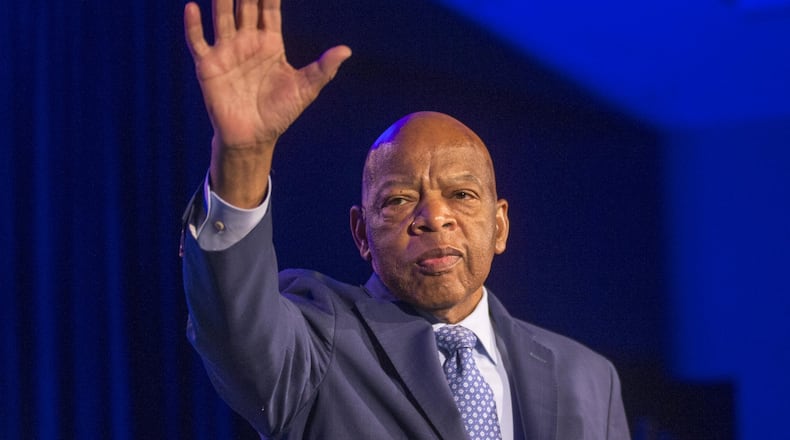U.S. Rep. John Lewis famously tells the story of reaching the apex of the Edmund Pettus Bridge in Selma on March 7, 1965 — Bloody Sunday.
He and Hosea Williams were leading a group of civil rights marchers from Selma to Montgomery when they were violently beaten back by police officers wielding clubs, whips and tear gas.
Today, the 79-year-old civil rights icon and longtime Georgia congressman is facing another battle — pancreatic cancer.
“It is a challenge and a fight. But I have had challenges before and been fighting all my life,” Lewis told The Atlanta Journal-Constitution in an exclusive interview on New Year’s Eve. “I am ready for the fight. I will go through the treatment and face the day each day like it is a new day. I will continue to be hopeful and optimistic.”
Lewis shocked the nation Sunday when he announced quietly that he had stage four pancreatic cancer, which was confirmed during a routine medical visit this month.
“I am doing good," said Lewis, who has maintained relatively good health. "I am feeling well.”
Lewis said that he will return to Washington, D.C., later this week in preparation for the legislative session that begins on Monday and to prepare for the beginning of his treatment.
He would not go into details on what his treatment will look like but said he is looking forward to it.
“As you well know, I will be going through something that I have never been through before,” Lewis said. “I have had friends and colleagues who have gone through similar situations. I will be talking and learning from them and obeying my physicians.”
Five things to know about Rep. John Lewis
Pancreatic cancer is the nation’s third leading cause of cancer deaths. Roughly three-quarters of people who develop the cancer die within a year of diagnosis, though new advances are showing signs of success.
Medical experts contend that at this stage, treatment will likely focus on preventing the disease from spreading further and inhibiting symptoms from growing worse.
Lewis added that those new treatment options are “no longer debilitating as they once were” which has given him hope.
He said he has no plans to retire from the seat that he has held for 32 years, and he plans to seek re-election. He was first elected to the U.S. House in 1986, defeating Julian Bond to become the second African-American to represent Georgia in Congress since Reconstruction.
He has been reelected 16 times and ran unopposed in 2018 for his latest two-year term. No serious candidate has emerged in 2020 to challenge him in the heavily Democratic 5th Congressional District.
Awarded the Presidential Medal of Freedom in 2010 by then-President Barack Obama, Lewis has not enjoyed the same kind of relationship with the current administration and has been one of President Donald Trump’s fiercest critics, earning him the unofficial title as the “conscience of the House.”
Lewis voted to impeach Trump.
Before he was a member of the U.S. House of Representatives, Lewis was and remains a key figure in America’s civil rights movement. A key ally of the Rev. Martin Luther King Jr., Lewis was the youngest speaker at the 1963 March on Washington, representing the Student Non-Violent Coordinating Committee, of which he was the chairman.
In 1961, as one of the original Freedom Riders, he was beaten and bloodied as they rode through the South addressing laws prohibiting black and white riders from sitting next to each other on public transportation.
The 1965 attack in Selma, where Lewis has said, “I thought I saw death. I thought I was going to die,” sparked nationwide support, sympathy and horror and spurred Congress to move on what became the Voting Rights Act of 1965.
All of that good-will has translated. Since his announcement, social media has been flooded with well-wishes for the congressman, from school children in rural Georgia to Obama who said: “If there’s one thing I love about John Lewis, it’s his incomparable will to fight. I know he’s got a lot more of that left in him. Praying for you, my friend.”
Lewis said: “It means so much that people all over America and different parts of the world are worried about me. After the announcement, in a matter of a few hours, I had more than 154 calls coming to my personal phone. A lot of it from young people, and some people my age, who have been deeply moved and inspired by the civil rights movement. That is what the movement was all about, trying to help people.”
Atlanta Journal-Constitution reporter Ernie Suggs has covered parts of Congressman John Lewis’ life for more than 20 years. He was in Washington, D.C., on Christmas break when news broke of Lewis’ diagnosis. Suggs tracked Lewis down for an exclusive interview.
About the Author
Keep Reading
The Latest
Featured




